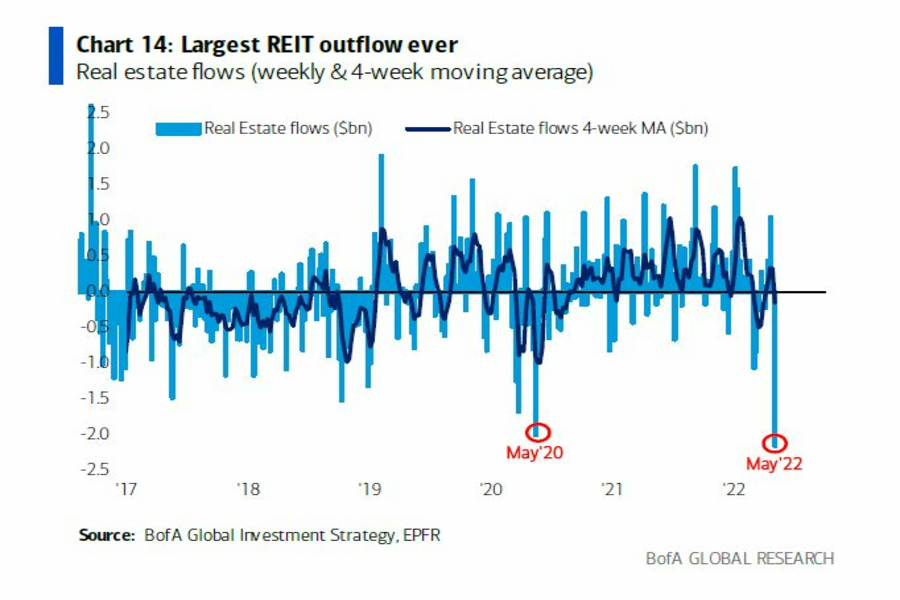

The global market selloff that saw the S&P 500 Index post its worst first four months of a year since 1939 has further to run, according to Bank of America Corp.
“Base case remains equity lows, yield highs yet to be reached,” BofA strategists led by Michael Hartnett wrote in a note.
Every asset class saw outflows in the week prior to the Federal Reserve’s meeting, with real estate posting its biggest outflow on record — $2.2 billion — and investors piling into safe havens like U.S. Treasuries, BofA said, citing EPFR Global data through Wednesday.
The Nasdaq 100 Index tumbled 5.1% on Thursday, the most since September 2020, slumping along with most bond markets and unwinding the prior day’s post-Federal Reserve bounce. The wild two days for markets leaves the tech-heavy gauge down 21% for the year amid concerns about inflation, aggressive rate hikes and an economic slowdown.
European stocks and U.S. futures fell on Friday morning in London, signaling the selloff may continue.

“Paralysis rather than panic best describes investor positioning,” Hartnett wrote, saying the market is grappling with how to price in inflation and slowing growth.
“‘Recession shock’ was priced-in too quickly; this is a problem as stronger-than-expected economic data in the first half is causing the market to price-in longer/bigger inflation/rates shock,” he wrote.
Still, Hartnett noted that the average entry point for $1.1 trillion in inflows to the S&P 500 since January 2021 was 4,274 index points, meaning that investors are “under water but only somewhat” for now, with the gauge at around 4,147 points.

While industry statistics pointing to a succession crisis can cause alarm, advisor-owners should be free to consider a middle path between staying solo and catching the surging wave of M&A.

New joint research by T. Rowe Price, MIT, and Stanford University finds more diverse asset allocations among older participants.

With its asset pipeline bursting past $13 billion, Farther is looking to build more momentum with three new managing directors.

A Department of Labor proposal to scrap a regulatory provision under ERISA could create uncertainty for fiduciaries, the trade association argues.

"We continue to feel confident about our ability to capture 90%," LPL CEO Rich Steinmeier told analysts during the firm's 2nd quarter earnings call.
Orion's Tom Wilson on delivering coordinated, high-touch service in a world where returns alone no longer set you apart.
Barely a decade old, registered index-linked annuities have quickly surged in popularity, thanks to their unique blend of protection and growth potential—an appealing option for investors looking to chart a steadier course through today's choppy market waters, says Myles Lambert, Brighthouse Financial.
